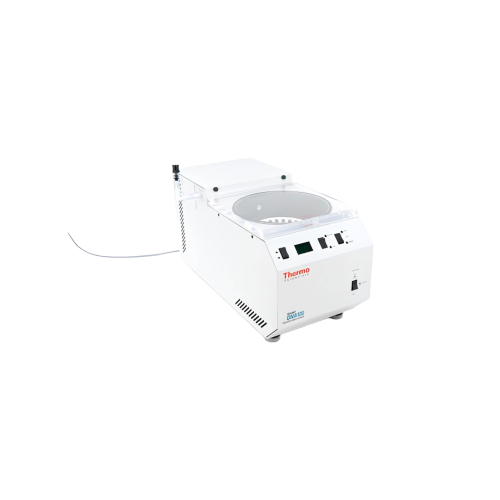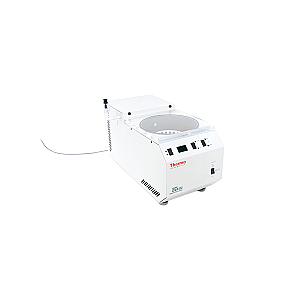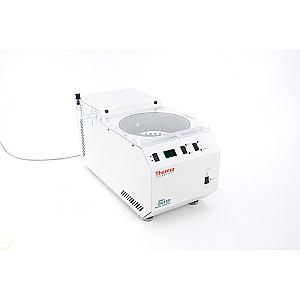The Thermo Fisher Scientific DNA120-230 concentrator is designed for medical and research applications requiring rapid concentration of DNA or RNA samples. Compact and quiet, it features an oil-free membrane vacuum pump, eliminating the need for maintenance. This model is compatible with an RD36 rotor capable of holding up to 36 microtubes from 1.5 to 2 ml. Suitable for mild solvents such as PCR buffers, water or ethanol-water mixtures, it is ideal for molecular biology laboratories. Its adjustable timer and three heating levels ensure precise and safe control of the process.
DNA120-230 Medical Vacuum Concentrator - Perfect Condition





Offer Details
Accessories :
9185
Options :
Thermo Scientific SpeedVac DNA120-230 Concentrator with RD36 Rotor
Description
DNA120-230 Concentrator: Compact Performance for Genetics and Molecular Biology Laboratories
The DNA120-230 model from Thermo Fisher Scientific is a SpeedVac vacuum concentrator specifically designed for handling nucleic acids. It is a compact solution that integrates both the concentrator and the vacuum pump, facilitating the evaporation of solvents in microcentrifuge tubes. Thanks to its RD36 rotor, the device can process up to 36 samples simultaneously, optimising workflow in medical environments and specialised laboratories.
One of the major advantages of this model is its oil-free ETFE diaphragm vacuum pump, which eliminates maintenance while ensuring consistent performance. The DNA120-230 achieves a vacuum of more than 7 Torr (approximately 9 mbar) with a flow rate of 36 litres per minute at 60 Hz. Its design without an integrated refrigerated trap is ideal for evaporating low-volatility solvents such as water or ethanol, which are often used in PCR buffers.
Users can choose between three pre-set drying temperatures: ambient, 43°C or 65°C, depending on the requirements of the samples. The duration is controlled by a timer ranging from 1 minute to 10 hours, offering complete flexibility in protocol programming. The chamber is protected by a Plexiglas® cover, ensuring both visibility and safety during use.
Designed without a vacuum control ramp or level adjustment, this concentrator is intended for facilities seeking a simple, robust and effective solution for standard molecular biology applications, such as sample preparation prior to electrophoresis or microarrays.
Thanks to its reliable performance and ease of use, the DNA120-230 is ideal for molecular diagnostics laboratories, hospital genetics units, academic laboratories and biomedical research centres. It allows samples to be concentrated quickly before analysis, while ensuring excellent preservation of nucleic acid integrity.
This concentrator meets the reproducibility and safety requirements essential in medical environments. It is a wise choice for teams looking to optimise their evaporation protocols without the hassle of complex or energy-intensive systems.
Features
- Concentrator + pump integrated into a single housing
- Oil-free, maintenance-free operation
- Compatible with weak solvents (water, ethanol, PCR buffers)
- Safe heating with three pre-programmed levels
- Long-life timer for flexible protocols
- Low bench space requirement
- 36 x 1.5 ml rotor
Technical Details
- Voltage: 230 V / 50 Hz
- Vacuum pump: Oil-free ETFE membrane
- Maximum vacuum: > 7 Torr (9 mbar)
- Flow rate: 36 litres/min at 60 Hz
- Heat control: 3 levels (Ambient, 43 °C, 65 °C)
- Cover: Plexiglas®
- Timer setting: From 1 minute to 10 hours
- Dimensions (W x H x D): 290 x 290 x 630 mm
- Weight: 39 kg
Compatible Accessories
- 1.5 to 2 ml microcentrifuge tubes
- Additional racks for specific samples
- Alternative capacity rotor (other formats)
- Chemical traps (for alternative applications)
- Adapters or inserts for tubes of different volumes